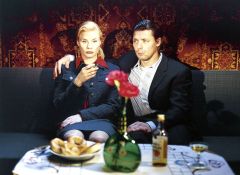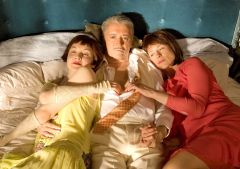53rd THESSALONIKI INTERNATIONAL FILM FESTIVAL
November 2 - 11, 2012
PRESS RELEASE
TRIBUTES
Three diverse and unique directors are being celebrated this year in the 53rd edition of the Thessaloniki International Film Festival: Aki Kaurismaki (Finland), Bahman Ghobadi (Iran) and Andreas Dresen (Germany).
All three directors will attend the event to present and discuss their work. In addition, the TIFF will publish a book on Aki Kaurismaki’s work, with new textual analyses and film critiques.
AKI KAURISMAKI
 Aki Kaurismaki, born in 1957 in Orimattila, is not only the most well-known Finnish filmmaker along with his brother Mika, but one of the most distinct auteurs of the past three decades. He started making films by collaborating with Mika and ventured on his own for the first time with Crime and Punishment in1983, updating Dostoyevsky’s novel and immediately establishing his unique type of filmmaking. Among the numerous awards he has garnered over the years are: the Interfilm Award at the 1990 Berlin IFF for The Match Factory Girl, the FIPRESCI Award at the 1992 Berlin IFF for La vie de boheme, the Grand Prize of the Jury and the Prize of the Ecumenical Jury at the 2002 Cannes IFF for The Man Without a Past and the FIPRESCI Award and the Ecumenical Jury Special Mention at the 2011 Cannes IFF for Le Havre.
Aki Kaurismaki, born in 1957 in Orimattila, is not only the most well-known Finnish filmmaker along with his brother Mika, but one of the most distinct auteurs of the past three decades. He started making films by collaborating with Mika and ventured on his own for the first time with Crime and Punishment in1983, updating Dostoyevsky’s novel and immediately establishing his unique type of filmmaking. Among the numerous awards he has garnered over the years are: the Interfilm Award at the 1990 Berlin IFF for The Match Factory Girl, the FIPRESCI Award at the 1992 Berlin IFF for La vie de boheme, the Grand Prize of the Jury and the Prize of the Ecumenical Jury at the 2002 Cannes IFF for The Man Without a Past and the FIPRESCI Award and the Ecumenical Jury Special Mention at the 2011 Cannes IFF for Le Havre.
11 of Kaurismaki’s films will be screened during the 53rd TIFF.
Kaurismaki’s universe is decidedly Finnish, yet his films have an unquestionable universal appeal. They are bleak and funny, minimalist and melodramatic, subtly ironic, muted, yet dreamlike (owing much to Timo Salminen’s extraordinary cinematography) and full of rock ‘n’ roll, as well as a broader love for vintage Americana. His heroes, blue-collar underdogs (as well as various delightful dogs), losers, unemployed and homeless, are amongst the most dignified and solemnly droll characters in international cinema. They are men and women of a few words and sparse smiles, who don’t belong in the system, but often find love, joy and purpose outside of it, and Kaurismaki rewards them for that. Although his characters go through difficulties of varying degrees, they get the happy, hopeful endings that they deserve; in fact, audiences always root for them, which is one of the Finnish director’s greatest talents. Societal and economic conditions, as well as the realities of class, are always present in Kaurismaki’s films, most notably in the Working Class Trilogy (Shadows in Paradise, Ariel, The Match Factory Girl) and the Loser Trilogy (Drifting Clouds, The Man Without A Past, Lights in the Dusk), which reflects the Finnish economic crisis that hit the country in the 1990s. Kaurismaki, socially committed but never didactic, narrated these tales of woe by creating wonderfully unassuming comedies. His oeuvre definitely has something to do with what the Finns call sisu, an accurately untranslatable word that refers to a specifically Finnish trait: a resilience, obstinacy and determination to deal with difficult situations, as well as a degree of brave madness required to do so.
THE FILMS:
Le Havre, Finland/France/Germany, 2011, 93’
Lights in the Dusk (Laitakaupungin valot), Finland/Germany/France, 2006, 78’
The Man Without a Past (Mies vailla menneisyytta), Finland/Germany/France, 2002, 97’
Juha, Finland, 1999, 78’
Drifting Clouds (Kauas pilvet karkaavat), Finland, 1996, 96’
La vie de boheme, France/Germany/Sweden/Finland, 1991, 100’
Leningrad Cowboys Go America, Finland/Sweden, 1989, 79’
The Match Factory Girl (Tulitikkutehtaan tytto), Finland/Sweden, 1989, 69’
Ariel, Finland 1988, 73’
Shadows in Paradise (Varjoja paratiisissa), Finland 1986, 76’
Crime and Punishment (Rikos ja rangaistus), Finland 1983, 94’
BAHMAN GHOBADI
 Bahman Ghobadi was born in 1969 in Baneh, a city near the Iran-Iraq border in the province of Kurdistan; Ghobadi moved to Tehran in 1992. He started his career as an industrial photographer and soon started shooting 8mm documentary shorts. His breakthrough as a director came with short Life in a Fog (1999) and in 2000 he shot A Time for Drunken Horses, his first feature and the first Kurdish feature in the history of Iran. Over the years, Ghobadi has garnered international praise and a multitude of awards, such as: the Camera d’ Or and the FIPRESCI Award at the 2000 Cannes IFF for A Time for Drunken Horses, the Golden Shell at the 2004 San Sebastian IFF for Turtles Can Fly and the People’s Choice Award at the 2007 Istanbul IFF for Half Moon. In 2000 Ghobadi founded production company Mij Film, which focuses on films by Kurdish and other ethnic minority directors in Iran.
Bahman Ghobadi was born in 1969 in Baneh, a city near the Iran-Iraq border in the province of Kurdistan; Ghobadi moved to Tehran in 1992. He started his career as an industrial photographer and soon started shooting 8mm documentary shorts. His breakthrough as a director came with short Life in a Fog (1999) and in 2000 he shot A Time for Drunken Horses, his first feature and the first Kurdish feature in the history of Iran. Over the years, Ghobadi has garnered international praise and a multitude of awards, such as: the Camera d’ Or and the FIPRESCI Award at the 2000 Cannes IFF for A Time for Drunken Horses, the Golden Shell at the 2004 San Sebastian IFF for Turtles Can Fly and the People’s Choice Award at the 2007 Istanbul IFF for Half Moon. In 2000 Ghobadi founded production company Mij Film, which focuses on films by Kurdish and other ethnic minority directors in Iran.
Ghobadi’s oeuvre is concerned with and inspired by his Kurdish ethnicity, the struggle of his people, as well as their vibrant culture and vivacious music. His films are tapestries, woven with powerful characters, strong melodies, mythical echoes and hauntingly beautiful imagery; they are inextricable from Ghobadi’s family history and that of his people. As the filmmaker often states, it is a history of fighting, but also of hope.
His latest film, Rhino Season (Greek premiere), inspired by the true story of a Kurdish poet who was imprisoned for three decades, is lyrical and elliptical, with extraordinary cinematography; the politics are almost an undercurrent, although never forgotten. Shot in Iraq and Turkey (Ghobadi has left Iran as a political exile), with Behrouz Vossoughi and Monica Bellucci starring as the poet and his wife, the film has an almost mystical quality: words are rarely spoken, past and present blend seamlessly and otherworldly visions create a cinematic work of poetry.
THE FILMS:
Rhino Season (False Kargadan), Iraqi Kurdistan/Turkey, 2012, 103’
No One Knows About Persian Cats (Kasi az gorbehaye irani khabar nadareh), Iran, 2009, 106’
Half Moon (Niwemang), Iran/Iraq/Austria/France, 2006, 107’
Turtles Can Fly (Lakposhtha parvaz mikonand), Iraq/Iran, 2004, 98’
A Time for Drunken Horses (Zamani baraye masti asbha), Iran, 2000, 75’
ANDREAS DRESEN
 Andreas Dresen was born in 1963 in East Germany and studied directing at the Konrad Wolf Academy of Film and Television. Since 1992, he has been working steadfastly as a writer and director for film, TV –documentary and fiction–, theater and opera and has won numerous prestigious awards, some of which are: the Silver Bear – Grand Jury Prize at the 2002 Berlin IFF for Night Shapes, the Coup De Coeur Award at the 2008 Cannes IFF for Cloud 9, the Best Director Award at the 2009 Karlovy Vary IFF for Whisky With Vodka and the Prix Un Certain Regard in the 2011 Cannes IFF for Stopped on Track.
Andreas Dresen was born in 1963 in East Germany and studied directing at the Konrad Wolf Academy of Film and Television. Since 1992, he has been working steadfastly as a writer and director for film, TV –documentary and fiction–, theater and opera and has won numerous prestigious awards, some of which are: the Silver Bear – Grand Jury Prize at the 2002 Berlin IFF for Night Shapes, the Coup De Coeur Award at the 2008 Cannes IFF for Cloud 9, the Best Director Award at the 2009 Karlovy Vary IFF for Whisky With Vodka and the Prix Un Certain Regard in the 2011 Cannes IFF for Stopped on Track.
Andreas Dresen’s many films, a selection of which will be presented during the 53rd TIFF, are founded on an unwavering dedication to everyday human stories. His characters, skillfully fleshed out, are never depicted with a critical attitude, no matter their faults or mistakes; Dresen and his actors often use improvisation to create them. The septuagenarian lovers in Cloud 9, the homeless man in Night Shapes, the friends in Summer in Berlin, are all complex, complete personalities, with humor, sadness and hope. Dresen’s films, although diverse in theme and style, share a brand of realism concerned with the search for emotional truth, as well as a deep and sincere affection for humanity and humans: more than anything else, this is his signature as an auteur.
Stopped on Track (2012), Dresen’s newest film, which will hold its Greek premiere during the 53rd TIFF, is about a family man diagnosed with brain cancer. Completely improvised and without a script, it offers a gentle, yet honest look to a heartrending condition; its intimacy and meticulousness make for a superb film.
THE FILMS:
Stopped on Track (Halt auf freier Strecke), Germany, 2012, 105’
Whisky With Vodka (Whisky mit Wodka), Germany, 2009, 105’
Cloud 9 (Wolke 9), Germany, 2008, 95’
Summer in Berlin (Sommer vorm Balkon), Germany, 2005, 110’
Grill Point (Halbe Treppe), Germany, 2002, 106’
Night Shapes (Nachtgestalten), Germany, 1999, 103’
















